Allicin : A powerful Defense molecule
Allicin is a phytonutrient found in garlic cloves that has antioxidant, antibacterial and anti-fungal effects. It’s one reason why eating garlic is linked to widespread health benefits, like cardiovascular health, better cognition, fighting cancer, treating methanogenic SIBO, lowering oxidative stress, resistance to infection, constipation, and other anti-aging effects. Here in this blog we will discuss the various benefit of allicin, bioavailability in garlic, its therapeutic dose for various conditions and any caution regarding the supplementation use.
What is Allicin
Garlic is a widely used ingredient in cooking. It is also vital for its antioxidant properties and other health benefits. The clove of garlic produces a vital chemical called Alliin. When the garlic cloves are chopped, crushed or cut, an enzyme called alliinase gets activated which eventually converts alliin into allicin. In intact plants, alliin and alliinase are kept in a different cell compartments, coming into contact only when the cloves are broken.
Organosulfur compounds such as allicin is considered to be an “unstable” compound because it’s only present in fresh, unheated garlic that has been cut or crushed, but not cooked. Its chemical composition changes quickly once it’s extracted and consumed as it enters the gastrointestinal tract, plus it also gives crushed garlic its characteristic pungent odour. Heating or cooking garlic has been shown to reduce its antioxidant, antibacterial and vascular protective effects, since it changes the chemical composition of sulfur compounds. It is best to consume the cut garlic after 5-10 minutes of chopping.
Benefits of Allicin
The health benefits of allicin are limitless. Allicin treats different health conditions from heart diseases to cancer. Some functions of allicin help fight SIBO while others help cure constipation.
Treating SIBO
SIBO has different types like hydrogen dominant SIBO, hydrogen sulfide dominant SIBO and Methane dominant SIBO. Allicin is a primary source of treatment for a type of SIBO called Intestinal Methanogenic Overgrowth(IMO). Allicin is thus majorly used to treat methanogenic archaea which is a type of bacterial overgrowth. These kinds of bacteria are difficult to break down and the allicin extract from garlic is a powerful element to carry out this task. Allicin have shown antibacterial activity against both gram-negative and gram-positive bacteria.
Dosage Recommendation: Whole or crushed garlic cloves may sometimes activate SIBO symptoms. Thus. a SIBO patient must stick to consuming the antibacterial allicin extract from garlic. One can consume allicin in the form of tablets or pills and safe dosage of 1800 to 2700 mg per day split into 2-3 dosage for 4 to 6 weeks.
Antimicrobial benefits of allicin
Crushed garlic is a leading agent or edible plant used against harmful types of microorganisms like certain kinds of bacteria, viruses, fungi and protozoa. But in 1944, Cavallito along with his team discovered the antimicrobial activities of crushed garlic cloves. The cloves in a garlic pod remain odourless until they are crushed. The two substances called alliin and alliinase are present in a garlic clove separately. The separation of these two elements fights against the microbial pathogens of the soil. Also, the allicin produced by fresh garlic is the most potent in restricting the growth of bacteria and harmful microorganisms in the body.
Allicin affects various physiological processes in microorganisms. For instance, allicin reacts with free thiol groups and thus, performs its main microbial functions through interactions with enzymes with thiol content. Allicin is antifungal, antiviral and even antiprotozoal. Allicin also fights against various pathogens, such as helicobacter pylori, E. coli, yeast infections, antibiotic resistance strains, and others
Improving Immunity
Poor immune system is responsible for causing many health complications and diseases in the human body. Aged garlic extracts filled with allicin have an immunomodulation effect. This effect of garlic tends to display modulation of cytokines and act as mediators of inflammation. Additionally, allicin shows anti-inflammatory properties. A supplement with allicin helps prevent the frequent episodes of common colds in people with a weak immune systems. Allicin is thus vital to improve immunity and inhibit different health complications and diseases related to a weak immune system.
Treating Constipation
Allicin is an effective treatment for constipation. Multiple causes lead to a constipated digestive system. Some common causes for constipation are:
- Hormonal imbalances due to diabetes
- Colon cancer
- Diet low in fiber
- Cardiovascular problems and strokes
Allicin helps relieve various causes related to constipation thereby curing the digestive system. Here’s how allicin helps treat the root causes of constipation.
Cardiovascular Benefits of allicin
There are different causes of cardiovascular diseases. For instance, primary causes of heart diseases are high cholesterol, increased platelet aggregation or sulphur deficiency. Normally, several dietary and genetic factors influences the efficiency of the H2S and NO signalling pathways and may contribute to the development of hypertension. The intake of the dry extract, carefully titrated, seem to have positive effects on the elasticity of the aorta. Allicin stimulate the production of the vascular hydrogen sulphide (H2S) and enhance the regulation of endothelial nitric oxide (NO), which induces smooth muscle cell relaxation, vasodilation, and BP reduction. The calcium channel blocker action may explain the hypotensive effect of garlic. Allicin consumption helps in reduction of total cholesterol and low-density lipoprotein (LDL) cholesterol and a moderate increase in high-density lipoprotein (HDL) cholesterol. In addition to this, platelet aggregation is also reduced with the help of allicin.
Anticancer benefits of allicin
The proliferative effects of garlic against various kinds of cancers is due to the breakdown products of the alliin enzyme present in garlic. Allicin, one of the products of alliin plays a key role in the antiproliferative effects which further lead to a decrease in the levels of intracellular glutathione in the body. Not only this, but allicin is also responsible for blocking substances like nitrosamines formation and bioactivation. These substances are carcinogens which are primarily responsible for developing the risks of different types of cancer in the human body. Allicin present in garlic overall reduces the bioactivation of such carcinogens in the body. Allicin along with its corresponding sulfite blocks the proliferation of different human non-leukaemia cells like breast hepatic and even prostate cancer.
Protein and Fat Profile
Another primary function of allicin is to keep protein and fat levels in check. Allicin reduces serum protein levels and even fat levels in the body. Regular use of fresh garlic rich with allicin or even supplements with allicin content altogether reduces the levels of serum proteins and fat profile in the body. If consumed regularly for 3-4 weeks, garlic helps reduce weight and result in a decline in unhealthy fats in the body.
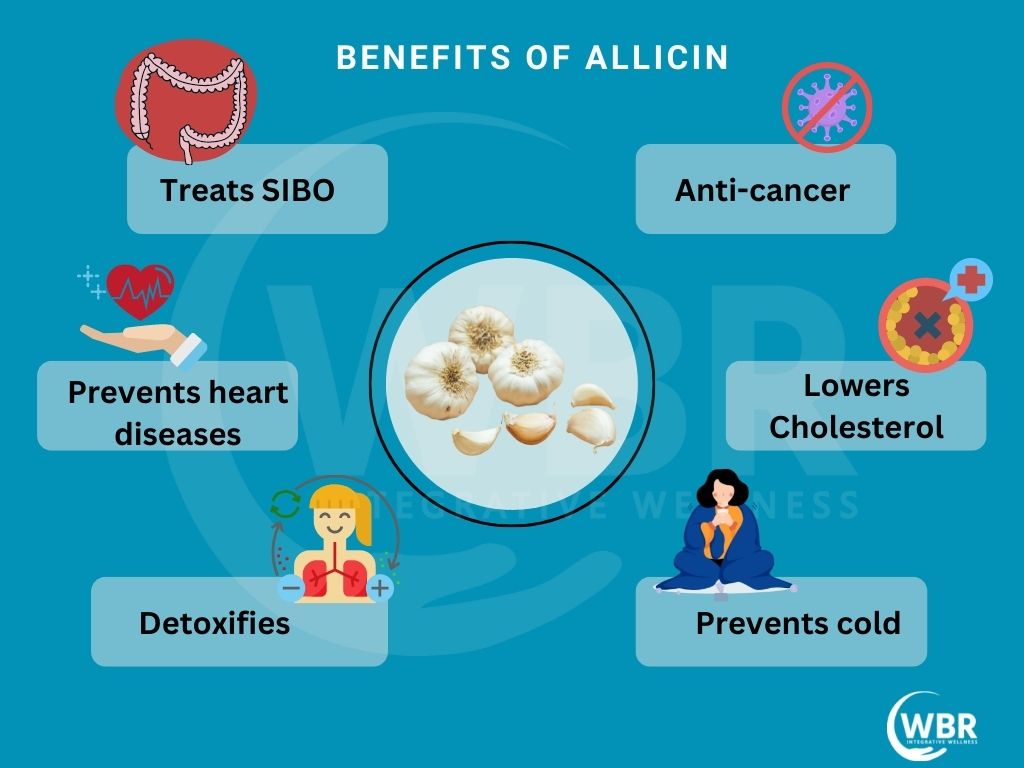
Possible Side Effects of Allicin
Allicin, in most cases, is safe to use. But in some cases, regular use of allicin specially high dose can leads to certain side effects and risk factors in some individuals. The primary cause of these side effects is use of certain medications or some prevalent health conditions or a temporarily detox symptoms due to toxins released by the bacteria or fungi as die-off reactions. But these side effects are temporary and go away in a few days. Here are some common side effects of allicin.
- Belching
- Nausea
- Diarrhea
- Heartburn
- Bleeding due to blood clotting
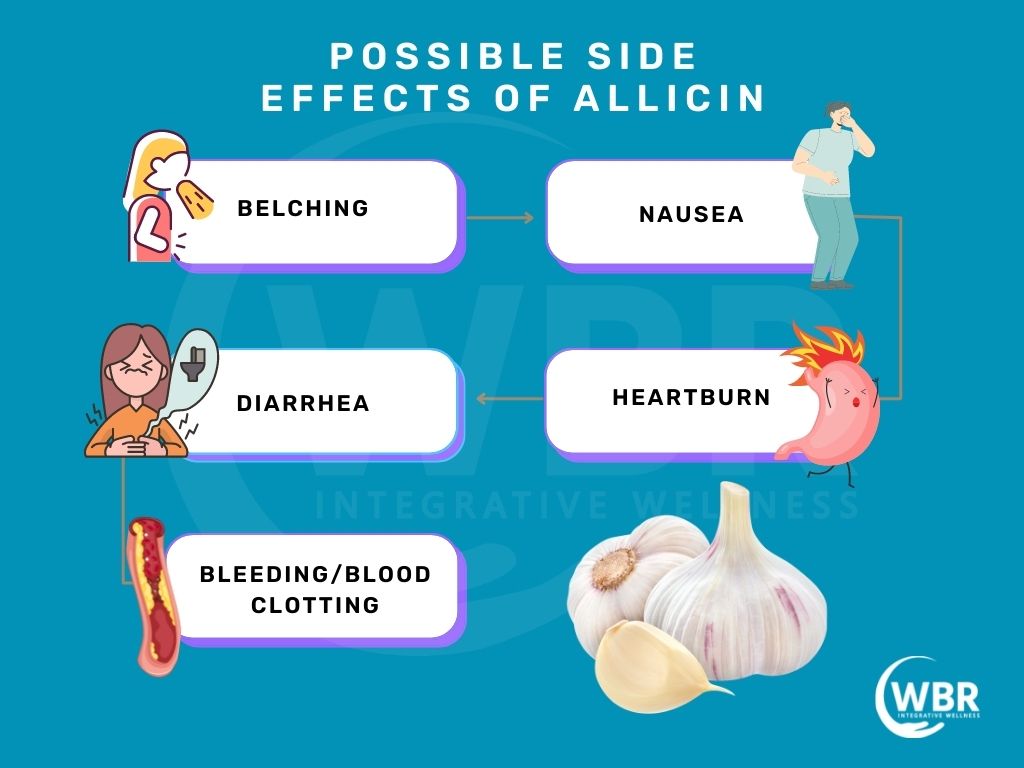
Supplement
With Allium sativum, or garlic, the consumer must distinguish between the garlic bulb and oil, if it was extracted, and what percentage of common sulfur-containing compounds (alliin, allicin, diallyl sulfide, or ajoene) is represented in the product. For all botanical ingredients, high-quality products should clearly distinguish the part (aerial, bulb, fruit, leaf, herb, rhizome, or root), as well as if there is a particular marker compound to which the botanical ingredient has been standardised.
Allicin are not sufficient in freshly chopped garlics or one can consume allicin supplements to get various benefits of allicin. Here are some of the most commonly used allicin supplements.
- Pure Allicin extract of dosage 1800 -2700 mg per day can helps fight the methanogenic overgrowth/SIBO.
- Pure Allicin extract of dosage 450 – 600 mg per day helps fight cold and other viral infections.
- Pure Allicin extract of dosage 450 – 600 mg per day helps in lowering high blood pressure.
Use certified allicin supplements in the right dosage to reap the maximum benefits of allicin. Be sure to consult your doctor before using allicin supplements. If you suffer from blood pressure or blood sugar issues, then you must consult your doctor before intaking allicin in any form as it may lead to fluctuations in blood pressure and blood sugar levels. Higher doses (2,40 to 7,200 mg of garlic extract) may interact with medications including Warfarin, however moderate doses are safe to combine with most drugs. Also a high dosage is commonly not recommended for older adults as there is a strong evidence for inhibiting effect on platelets.
FAQs
- Raw minced garlic contains about 2-4 mg of allicin per gram. so roughly around 10-18 mg of allicin per clove.
- Roasted garlic contains less allicin per gram relative to raw garlic because the roasting process inhibits the activity of alliinase.
- Aged garlic, whole-pickled garlic, and black garlic have a much lower allicin content.
- Consuming a high-protein meal raises stomach pH to a level where the alliinase is active, so this support maximum allicin effectiveness.
- The allicin in garlic falls under the category of reactive sulphur. The property help allicin oxidise thiols in the body. The sulphuric properties of allicin make it a harsh ingredient for the throat and the stomach when consumed directly.
- Allicin to be avoided for the cases of peptic ulcer, gastritis, and cross-allergies (onion).
- The patients undergoing surgery should not consume allicin in any form as it can increase the risk of postoperative bleeding.
-
Women should avoid allicin supplements during pregnancy and lactation.
Conclusion
Humans use garlic as a medicinal food or ingredient since ancient days. Physicians from ancient Greece like Hippocrates, the father of Western medicine prescribed garlic to treat different health conditions. Even modern science validated the multiple benefits of using garlic in our diet. Allicin, a sulfur compound formed from fresh-cut garlic is a major source of treating different health conditions. There are many health benefits or functions of allicin. It is a fundamental element for treating diseases like common colds, cardiovascular problems and even cancer. The fresh allicin from crushed garlic also has some antimicrobial properties that make it useful against viral, bacterial and fungal infections too. Consuming allicin in raw form or even as a supplement does the job.

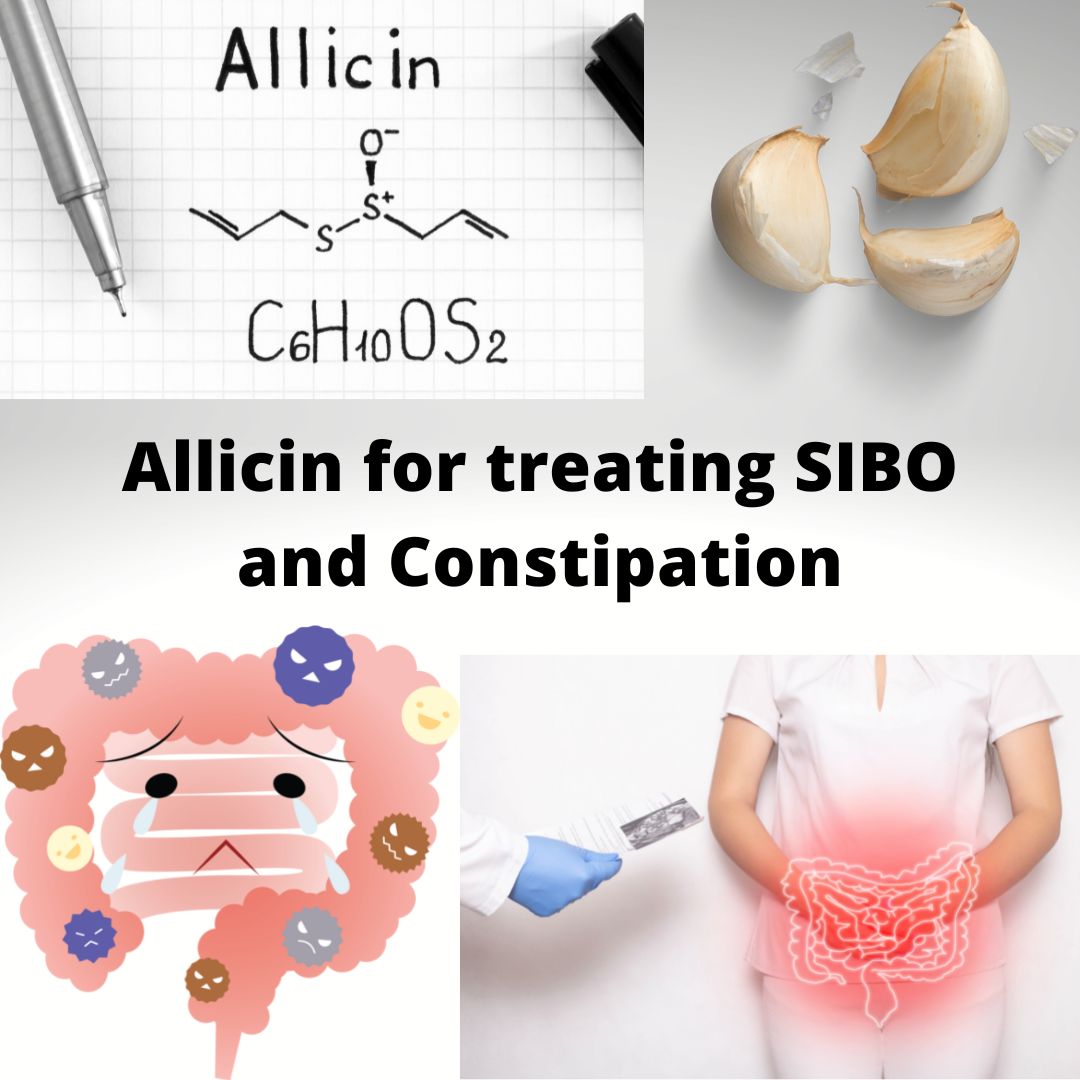

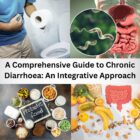

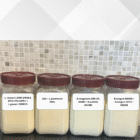




Rashmi Tandon
26-Sep-22Really helpful article and at the time when I needed to hear as I am having some allergy issues
Wellness By Rosh
7-Nov-22Thanks a lot Rashmi for your support and valuable feedback
How to Prevent and Control UTI Naturally - Wellness By Rosh | Integrative Wellness
22-Oct-22[…] Garlic and onion can help to fight UTIs because of their antimicrobial activity. They can kill bacteria and other microorganisms. It helps to prevent microorganisms from growing in the body. […]